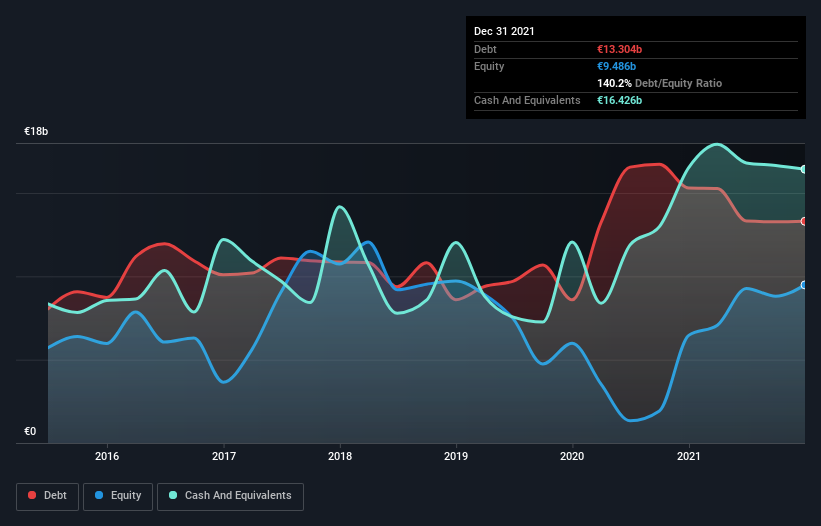
David Iben put it well when he said, 'Volatility is not a risk we care about. What we care about is avoiding the permanent loss of capital.' It's only natural to consider a company's balance sheet when you examine how risky it is, since debt is often involved when a business collapses. We can see that Airbus SE (EPA:AIR) does use debt in its business. But the real question is whether this debt is making the company risky.
Why Does Debt Bring Risk?
Debt and other liabilities become risky for a business when it cannot easily fulfill those obligations, either with free cash flow or by raising capital at an attractive price. If things get really bad, the lenders can take control of the business. However, a more common (but still painful) scenario is that it has to raise new equity capital at a low price, thus permanently diluting shareholders. By replacing dilution, though, debt can be an extremely good tool for businesses that need capital to invest in growth at high rates of return. When we examine debt levels, we first consider both cash and debt levels, together.
View our latest analysis for Airbus
What Is Airbus's Debt?
The image below, which you can click on for greater detail, shows that Airbus had debt of €13.3b at the end of December 2021, a reduction from €15.3b over a year. But it also has €16.4b in cash to offset that, meaning it has €3.12b net cash.

A Look At Airbus' Liabilities
According to the last reported balance sheet, Airbus had liabilities of €47.8b due within 12 months, and liabilities of €49.8b due beyond 12 months. Offsetting this, it had €16.4b in cash and €8.98b in receivables that were due within 12 months. So its liabilities total €72.2b more than the combination of its cash and short-term receivables.
This deficit is considerable relative to its very significant market capitalization of €81.9b, so it does suggest shareholders should keep an eye on Airbus' use of debt. This suggests shareholders would be heavily diluted if the company needed to shore up its balance sheet in a hurry. While it does have liabilities worth noting, Airbus also has more cash than debt, so we're pretty confident it can manage its debt safely.
Even more impressive was the fact that Airbus grew its EBIT by 568% over twelve months. If maintained that growth will make the debt even more manageable in the years ahead. There's no doubt that we learn most about debt from the balance sheet. But it is future earnings, more than anything, that will determine Airbus's ability to maintain a healthy balance sheet going forward. So if you're focused on the future you can check out this free report showing analyst profit forecasts.
Finally, a business needs free cash flow to pay off debt; accounting profits just don't cut it. While Airbus has net cash on its balance sheet, it's still worth taking a look at its ability to convert earnings before interest and tax (EBIT) to free cash flow, to help us understand how quickly it is building (or eroding) that cash balance. During the last three years, Airbus burned a lot of cash. While investors are no doubt expecting a reversal of that situation in due course, it clearly does mean its use of debt is more risky.
Summing up
Although Airbus's balance sheet isn't particularly strong, due to the total liabilities, it is clearly positive to see that it has net cash of €3.12b. And it impressed us with its EBIT growth of 568% over the last year. So we don't have any problem with Airbus's use of debt. The balance sheet is clearly the area to focus on when you are analysing debt. However, not all investment risk resides within the balance sheet - far from it. Be aware that Airbus is showing 1 warning sign in our investment analysis , you should know about...
At the end of the day, it's often better to focus on companies that are free from net debt. You can access our special list of such companies (all with a track record of profit growth). It's free.
New: Manage All Your Stock Portfolios in One Place
We've created the ultimate portfolio companion for stock investors, and it's free.
• Connect an unlimited number of Portfolios and see your total in one currency
• Be alerted to new Warning Signs or Risks via email or mobile
• Track the Fair Value of your stocks
Have feedback on this article? Concerned about the content? Get in touch with us directly. Alternatively, email editorial-team (at) simplywallst.com.
This article by Simply Wall St is general in nature. We provide commentary based on historical data and analyst forecasts only using an unbiased methodology and our articles are not intended to be financial advice. It does not constitute a recommendation to buy or sell any stock, and does not take account of your objectives, or your financial situation. We aim to bring you long-term focused analysis driven by fundamental data. Note that our analysis may not factor in the latest price-sensitive company announcements or qualitative material. Simply Wall St has no position in any stocks mentioned.
About ENXTPA:AIR
Airbus
Engages in the design, manufacture, and delivery of aerospace products, services, and solutions worldwide.
Flawless balance sheet with high growth potential.


